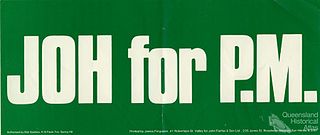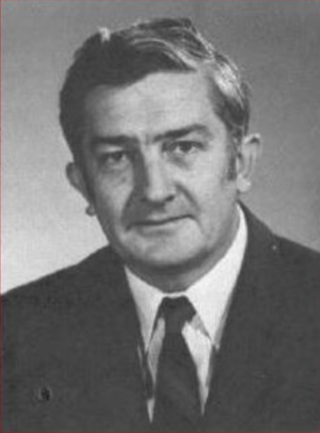Related Research Articles

Robert James Lee Hawke was an Australian politician and trade unionist who served as the 23rd prime minister of Australia from 1983 to 1991. He held office as the leader of the Australian Labor Party (ALP), having previously served as the president of the Australian Council of Trade Unions from 1969 to 1980 and president of the Labor Party national executive from 1973 to 1978.

Sir Johannes Bjelke-Petersen was a conservative Australian politician. He was the longest-serving and longest-lived premier of Queensland, holding office from 1968 to 1987, during which time the state underwent considerable economic development. He has become one of the most well-known and controversial figures of 20th-century Australian politics because of his uncompromising conservatism, political longevity, and the institutional corruption of his government.

Sir Billy Mackie Snedden, was an Australian politician who served as the leader of the Liberal Party from 1972 to 1975. He was also a cabinet minister from 1964 to 1972, and Speaker of the House of Representatives from 1976 to 1983.

The Joh for Canberra campaign, initially known as the Joh for PM campaign, was an attempt by Queensland National Party premier Sir Joh Bjelke-Petersen to become Prime Minister of Australia. The campaign was announced in January 1987 and drew substantial support from Queensland businessmen and some conservative politicians. The campaign caused a split in the federal Coalition. It did not attract widespread support and collapsed in June 1987. The Australian Labor Party, led by Bob Hawke, went on to win the 1987 federal election with an increased majority, gaining its highest-ever number of seats. Bjelke-Petersen came under increasing scrutiny as the Fitzgerald Inquiry gained traction, and was forced out of politics altogether in December 1987.

Ronald Leslie Doyle Boswell is a former Australian politician. He was a Senator for Queensland from 1983 to 2014, representing the National Party. He was the party's Senate leader from 1990 to 2007, a record term. He was also a parliamentary secretary in the Howard government from 1999 to 2003. He was Father of the Senate from 2008 until his retirement in 2014.

The 1993 Australian federal election was held to determine the members of the 37th Parliament of Australia. It was held on 13 March 1993. All 147 seats of the Australian House of Representatives and 40 seats of the 76-seat Australian Senate were up for election. The incumbent government of the centre-left Australian Labor Party led by Paul Keating, the Prime Minister of Australia, was re-elected to a fifth term, defeating the centre-right Liberal/National Coalition led by Opposition Leader John Hewson of the Liberal Party of Australia, and coalition partner Tim Fischer of the National Party of Australia. This was the first, and to date only, time the Labor Party won a fifth consecutive election.

Sir Walter "Wally" Benjamin Campbell, was an Australian judge, administrator and governor. He was the Chief Justice of the Supreme Court of Queensland, Chancellor of the University of Queensland and the 21st Governor of Queensland from 1985 to 1992.
Bjelke-Petersen is the name of an Australian family of Danish descent. The common ancestors of the Australian family are Georg Peter Bjelke-Petersen, a Danish farmer and master-builder, and his wife Caroline Vilhelmine. They came to Australia with their children in 1891. Born just Petersen, Georg hyphenated his name with the Danish word for wooden beam, some time in the 1860s.

The 1990 Australian federal election was held in Australia on 24 March 1990. All 148 seats in the House of Representatives and 40 seats in the 76-member Senate were up for election. The incumbent Australian Labor Party, led by Bob Hawke, defeated the opposition Liberal Party of Australia, led by Andrew Peacock, with its coalition partner, the National Party of Australia, led by Charles Blunt, despite losing the nationwide popular and two-party-preferred vote. The result saw the re-election of the Hawke government for a fourth successive term.
The following lists events that happened during 1987 in Australia.
The following lists events that happened during 1991 in Australia.

The 1987 Australian federal election was held in Australia on 11 July 1987, following the granting of a double dissolution on 5 June by the Governor-General Sir Ninian Stephen. Consequently, all 148 seats in the House of Representatives as well as all 76 seats in the Senate were up for election. The incumbent Australian Labor Party, led by Prime Minister Bob Hawke, defeated the opposition Liberal Party of Australia, led by John Howard and the National Party of Australia led by Ian Sinclair. This was the first, and to date only, time the Labor Party won a third consecutive election.
The following lists events that happened during 1975 in Australia.

The 1983 Australian federal election was held in Australia on 5 March 1983. All 125 seats in the House of Representatives and all 64 seats in the Senate were up for election, following a double dissolution. The incumbent Coalition government which had been in power since 1975, led by Malcolm Fraser and Doug Anthony, was defeated in a landslide by the opposition Labor Party led by Bob Hawke.

Peter Drew Durack, QC was an Australian politician, representing the Liberal Party. He rose to become Attorney-General of Australia.
A political family of Australia is a family in which multiple members are involved in Australian politics, particularly electoral politics. Members may be related by blood or marriage; often several generations or multiple siblings may be involved.

Kevin Michael Kiernan Cairns was an Australian dentist and politician. He was a member of the Liberal Party and served as Minister for Housing in the McMahon government from 1971 to 1972. He served in the House of Representatives for 15 years, representing the Queensland seat of Lilley from 1963 to 1972 and 1974 to 1980.
Glenister Fermoy Sheil was an Australian politician, representing the National Party in the Senate for the state of Queensland from 1974 to 1981, and again from 1984–90. He was an amateur tennis player who competed at the Australian Championships in the 1940s and 1950s.
Terrence Anthony White is an Australian pharmacist, businessman, and former politician. White achieved notoriety when, as Queensland state leader of the Liberal Party he terminated the longstanding coalition agreement between the Liberal Party and the National Party of Joh Bjelke-Petersen. In the ensuing election, the Liberals were badly defeated, and White was replaced as party leader. After leaving politics, he established TerryWhite Chemmart, a nationwide pharmacy franchise, and became a widely respected businessman.
The history of the Australian Labor Party has its origins in the Labour parties founded in the 1890s in the Australian colonies prior to federation. Labor tradition ascribes the founding of Queensland Labour to a meeting of striking pastoral workers under a ghost gum tree in Barcaldine, Queensland in 1891. The Balmain, New South Wales branch of the party claims to be the oldest in Australia. Labour as a parliamentary party dates from 1891 in New South Wales and South Australia, 1893 in Queensland, and later in the other colonies.
References
- "The origins of the crisis in immigration policy". Quadrant . 53 (12): 6–16. December 2009. Retrieved 8 August 2011.
- John Stone, archived from the original on 1 June 2012
- Stone, John (April 2008), "Time to Stop the Dreaming", Quadrant Magazine, 52 (4), archived from the original on 20 July 2008,
traditional Aboriginal culture is a violent culture